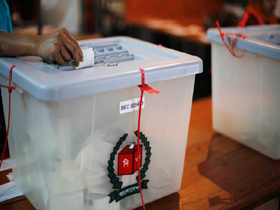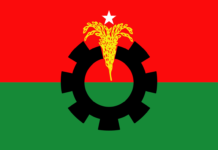Murder conspiracy mustn’t be excused as merely political rivalry
ANALYSIS/OPINION:
Ayear-and-a-half ago I received an out-of-the-blue phone call from the U.S. Department of Justice. The news was shocking: People were planning to abduct and possibly kill me.
It turned out that a former FBI agent, Robert Lustyik, was sentenced to five years in prison last year for selling secret information about a Bangladesh political figure living in the United States to his political rivals. I am that figure.
The person buying the FBI information was Rizve Ahmed Caesar. He and other Bangladeshis working against their government paid Lustyik to hand over everything about me the FBI had.
Why me? I am the son of Bangladesh Prime Minister Sheikh Hasina. Government opposition leaders wanted me dead.
This case has re-emerged in the news because Bangladesh law enforcement officials have been investigating the trail of Caesar’s activities, thanks to cooperation with U.S. officials. The trail led back to Bangladesh.
Police in Dhaka, Bangladesh’s capital, raided the home of a prominent editor and found some of the documents Lustyik stole from the FBI. These chillingly included my home and office addresses, my day-to-day movements and even the license plate number of my car.
The editor, Shafik Rehman, admitted to police that he got the documents from Lustyik. Mr. Rehman has been one of the key advisers of Khaleda Zia, leader of the Bangladesh Nationalist Party (BNP), which opposes my mother’s party and government. Ms. Zia was the prime minister of Bangladesh from 1991 to 1996 and from 2001 to 2006; my mother was prime minister from 1996 to 2001 and has been prime minister since 2009.
I won’t go into the weeds of the complex, highly partisan Bangladesh politics. But one thing is painfully clear: There is one organization that ties the plot to abduct me to the violence that has swept across my country for the past two years: the BNP.
The BNP began to foment violence and social disruption during Sheikh Hasina’s 2014 re-election. It decided to boycott the election because it said my mother’s party had rigged it. The truth is that the BNP knew its candidates would be soundly defeated and chose to quit rather than contest.
Having lost the war of ideas with Bangladeshi voters, the BNP turned to violence in a futile bid to unseat the democratically elected government.
With the help of its extremist ally, Jamaat-e-Islami, the BNP instigated strikes, derailed trains, blocked traffic with burning tires, firebombed busses and destroyed party offices. Jamaat criminals chased down and killed officials of my mother’s party, the Awami League officials, in broad daylight using machetes.
The government has responded to the violence by arresting and trying perpetrators without prejudice or favor. Caesar, a U.S. resident, is the son of a high-ranking BNP official. He pleaded guilty to paying Lustyik for the information about me. Court documents identify his target as “son of the Prime Minister and an adviser to the Prime Minister on information technology.” That’s me. He said he intended to “scare,” “kidnap” and “hurt” me. He even admitted to giving Lustyik’s information to a “journalist in Bangladesh,” obviously the information found by police in editor Rehman’s home. Rehman’s wife has admitted to Bangladesh media that he met with Lustyik and was involved in the financial transaction.
Yet Bangladesh appears to have a reality distortion field surrounding it on matters like this in which politics and violence are involved.
Rather than report on the actual plot to kidnap me, international media commentary has characterized the government’s law enforcement actions against the plotters as “a crackdown on dissent” (The New York Times) and as measures that “could threaten freedom of speech” (Voice of America).
Sadly, the coverage echoes international reaction to the government’s response to the BNP-Jamaat violence. Instead of reporting that the government is arresting wrongdoers and restoring law and order, international organizations opine that the government is trying to shut down political opposition and free speech (Human Rights Watch) and engaging in an ongoing opposition crackdown (Amnesty International).
Most of those arrested for the crimes of the past two years belonged to the BNP and Jamaat. They were arrested because they are the ones committing the crimes and for no other reason. Should criminals not be arrested because they belong to rival political parties? That’s a ridiculous — and dangerous — notion.
What if an abduction attempt against the son or daughter of another world leader had been uncovered? Would it have been covered in the same way? It would not.
- Sajeeb Wazed is Bangladesh’s chief information technology adviser and the son of the prime minister.
Source: http://m.washingtontimes.com/news/2016/may/18/sajeeb-wazed-bangladesh-political-intrigue-turns-p/?page=all










